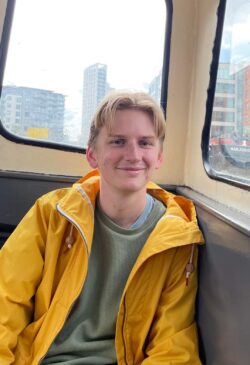Students
Omar Al Kindi
Project title: Naming Systems in Omani Vernacular Arabic.
Supervisors: Janet Watson and Jon Lovett
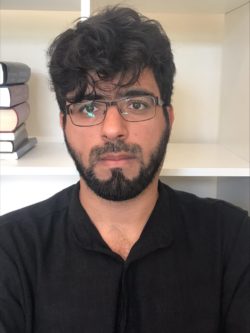
My PhD study comes in the context of ethnographic studies of cultural transitions in Oman, with great emphasis on the relationship between language and nature. The theory applied in the research focuses on the institutions as structures that regulate and constrain wide range of human actions including the linguistic practices such as: naming and terminology. According to this perspective, the analysis of the linguistic data is highly dependent on the institutional constraints imposed by the cultural and ecological settings. This study provides a new perspective for applying institutional economics for lexical semantic analysis of naming systems in vernacular Omani Arabic as examples of specialized linguistic data. The study also aims to recover some parts of the endangered cognitive and cultural background of the vernacular, especially the relationship between language and nature. The lexical knowledge of the generations born after 1970s witnesses a remarkable decline, especially nowadays in which the impact of globalization has become more severe.
Andrea Boom
Project Title: Language and Nature in South Arabia: Ethnographic description of traditional practices of Dhofar and Mahra
Supervisors: Janet Watson and Diane Nelson

Andrea Boom is a Commonwealth Scholar and PhD Candidate at the University of Leeds studying the link between endangered languages, cultures and ecosystems in southern Arabia. She is specifically interested in the human connection with the natural world and how languages and cultures adapt to their local environment. This research is particularly important today as people become disconnected from their immediate dependence on the natural world and knowledge of the symbiotic relationship between humans and their environment is disappearing. Her wider interests include partnership between academia and people with local knowledge to build collaborative projects making the local knowledge accessible to a wider audience.
Tim Brown
Project title: Is parasite conservation culturally feasible?
Supervisors: Simon Goodman, Ellen Clarke, Alison Dunn, Andrew Cunningham, Rupert Quinnell, Samuel Turvey
My research focuses on the extinction of parasites and the development of approaches for parasite conservation. The project involves evaluating the extinction risk of threatened parasite species, as well as engaging with conservation practitioners to understand different social and biological barriers to parasite conservation. I am also interested in the philosophy of conservation and how this applies to parasites – in particular the question of what biological units are appropriate targets for conservation, and why?
Charlotte Clay
Project Title: Predicting changes to coral reef community assembly using past coral reef extinctions
Supervisors: Maria Beger and Alex Dunhill
 My project aims to assess how coral reef community assembly is affected by our changing environment, with a particular focus on responses to climate change. It explores functioning and species interactions on coral reefs, using past reef transformations to predict future change, drawing on my background of applying quantitative approaches to ecological data sets to assess ecosystem functioning. I plan to explore how environmental change has affected coral reef ecosystem functioning and species linkages on Cenozoic and modern reefs, using past reef data to predict future change. As well as linking evolutionary theory to changing ecosystem functioning. I’m using networks to visualize the changes to the coral reef community assembly, as networks can capture the complexity of communities and highlight important connections between species. I also use trait-based analysis and trait networks to look beyond species extinctions and identify how changes to community assembly affect functioning. I hope my project will identify vulnerable species, interactions, and functional groups to future climate change, which can then be used to guide conservation strategies and reef management plans.
My project aims to assess how coral reef community assembly is affected by our changing environment, with a particular focus on responses to climate change. It explores functioning and species interactions on coral reefs, using past reef transformations to predict future change, drawing on my background of applying quantitative approaches to ecological data sets to assess ecosystem functioning. I plan to explore how environmental change has affected coral reef ecosystem functioning and species linkages on Cenozoic and modern reefs, using past reef data to predict future change. As well as linking evolutionary theory to changing ecosystem functioning. I’m using networks to visualize the changes to the coral reef community assembly, as networks can capture the complexity of communities and highlight important connections between species. I also use trait-based analysis and trait networks to look beyond species extinctions and identify how changes to community assembly affect functioning. I hope my project will identify vulnerable species, interactions, and functional groups to future climate change, which can then be used to guide conservation strategies and reef management plans.
Sicily Fiennes
Project Title: Opportunities for co-design of technology to address the Southeast Asian illegal bird trade
Supervisors: Chris Hassall, George Holmes and Tom Jackson
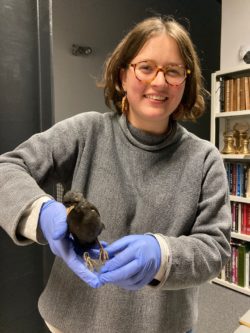
My doctoral research focuses on legal and illegal songbird trade in Asia and building machine learning tools to optimize species identification in markets. The main project is a machine learning-driven image recognition tool for species for use in bird markets in East Asia, targeted at law enforcement. I also seek to understand factors that influence the adoption and implementation of wildlife marketplace technologies amongst law enforcement and how this interacts with the risk of extinction of songbirds. I am also interested in opportunities for the co-creation of technology and decolonising design methods.
Alfie Howard
Project title: Animal speech and perceptions of threat in human-animal narratives from Kipling (1894) to Kivirähk (2007)
Supervisors: Graham Huggan and Diane Nelson

My PhD thesis examines anthropomorphism and representations of animal speech in fiction, with an emphasis on threats both to and from power. By analysing a range of texts, I explore different systems of power, including colonialism, class, patriarchy and human-animal relations. I am particularly interested in postcolonial studies and environmental humanities, and this year I am taking on the role of PGR coordinator for the Leeds Environmental Humanities Research Group.
Jenny Kennedy
Project title: Resisting cultural genocide: territorial destruction and resistance in Panama and Mexico
Supervisors: Thea Pitman and Adrian Gallagher
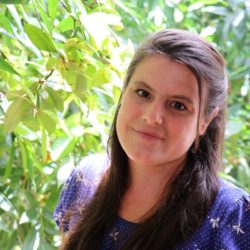
My research project focuses on understanding how Indigenous communities in Latin America are experiencing and resisting eco-genocidal processes. Specifically, I am looking at how development policies and megaprojects are driving territorial and cultural destruction in Mexico and Panama. As a trained journalist, I have reported on human rights, conservation and environmental issues in Latin America and beyond. Building upon my extensive experience working on Indigenous land rights and grassroots resistance to mining and hydroelectric dams in the region, I am conducting a year of ethnographic fieldwork in both countries, where I will take a collaborative and comparative approach.
Sarah Oakes
Project title: Roots: Exploring Indigenous biocultural heritage and potato diversity through participatory action research in Peru
Supervisors: Stephen Whitfield, Thea Pitman, Ipek Demir
 The potato is the third most consumed staple crop; global food security depends on its survival amid climate chaos. Urgent need for adaptation drives international scientists towards reductive approaches prioritizing genetics and production, with little consideration for Indigenous perspectives. Integrating Indigenous knowledge is critical for a holistic understanding of this at-risk bioheritage, as well as how climatic and cultural shifts are impacting it.
The potato is the third most consumed staple crop; global food security depends on its survival amid climate chaos. Urgent need for adaptation drives international scientists towards reductive approaches prioritizing genetics and production, with little consideration for Indigenous perspectives. Integrating Indigenous knowledge is critical for a holistic understanding of this at-risk bioheritage, as well as how climatic and cultural shifts are impacting it.
Sitting at the nexus of climate change, food security, Indigenous knowledge and cultural extinction, this research project focuses on sociocultural potato knowledge among rural farming communities in the Peruvian Andes. Following a participatory action research approach, it uses participatory videomaking to document the knowledge Indigenous communities themselves see as valuable, enabling their direct contributions to inform national and international research and decision-making around climate change, food security, agriculture and Indigenous rights. Drawing on my background in international development and science communications, combined with extensive experience in Peru, I aim to critically engage with and consider potential synergies between Indigenous epistemologies and Eurocentric science in an interdisciplinary way.
Katie Prosser
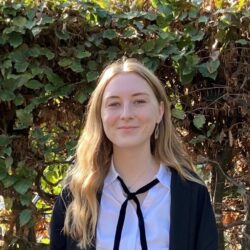 My PhD project is on the ethics of creating animals of extinct species, also known as “species revival” or “de-extinction.” I am interested in the extent to which species revival can undo, or accommodate for, the badness of extinction. Using a combination of philosophical and biological analysis, I assess how this differs across the different methods for creating animals of extinct species, from back-breeding to genetic engineering. The aim of my research is to get a better understanding on why we might pursue species revival, and whether species revival can be used as a form conservation.
My PhD project is on the ethics of creating animals of extinct species, also known as “species revival” or “de-extinction.” I am interested in the extent to which species revival can undo, or accommodate for, the badness of extinction. Using a combination of philosophical and biological analysis, I assess how this differs across the different methods for creating animals of extinct species, from back-breeding to genetic engineering. The aim of my research is to get a better understanding on why we might pursue species revival, and whether species revival can be used as a form conservation.
Jonathan D Roberts
Project Title: Hooking together Parasites and Societies: Biological and Social aspects of Human Hookworm Infection and Eradication in British Territories, c.1900-1935
Supervisors: Alison Dunn, Lorna Waddington and Graham Huggan

My current project involves the interdisciplinary entwining of epidemiology and history of medicine, in order to investigate how the actions of a parasite shapes the ways in which hosts understand the parasite, and how the host’s medical responses shape the parasite in turn. Exploring successful and unsuccessful attempts to induce extinction of parasites through eradication programmes, I aim to bring a different perspective on extinction through the study of human entanglement with the animals which we not only dislike but are actively attempting to make extinct.
Kate Simpson
Project Title: Polytemporal Poetics: Reimagining Deep Time

I am an editor, poet, and critic. Over the years, I have edited for renowned publishers including Aesthetica, Faber, Valley Press, New Writing North, Ambit and Magma, and have written broadly on poetry, fiction, and natural history for the TLS, the Telegraph, Poetry Review, Poetry London and PN Review, amongst others. My 2021 anthology, Out of Time: Poetry from the Climate Emergency, was a Poetry Book Society Special Commendation – lauded as the ‘definitive anthology for this decisive decade’. It was listed as one of the Guardian’s Books of the Year, and was lauded by Extinction Rebellion, amongst others.
My practice-led project sits between the School of English and the School of Earth and Environment, and focuses on producing a new creative methodology of ‘polytemporal poetics’ that addresses what geologist Marcia Bjornerud defines as a ‘temporal bias’ towards Earth’s larger, palimpsestic narrative. My research considers the role that poetry can play in changing how deep time is interpreted, experienced, and understood. I am interested in bridging the respective roles of the ‘poet’ and the ‘palaeontologist’, examining both disciplines and their expansive – yet limited – roles in excavating time to build a larger, semiotic framework. I am also interested in the long poem, and the cognitive space this employs.
Aureja Stirbyte
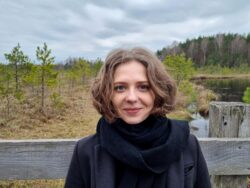 My research is concerned with white extinction anxiety from historical and sociological perspectives. I analyse the development of fears concerning the decline of white populations and culture historically and in their contemporary forms, with specific examples such as theories of ‘White Genocide’ and ‘Great Replacement’. I aim to show historical continuities and their deep roots in eugenics and white nationalist movements. I do so in opposition to the attempt to normalize these discourses as legitimate fears about the threat to ‘white identity’. Overall, I examine the histories of white supremacy and racism to understand the continuities of such discourses as well as particularities and differences of their current forms.
My research is concerned with white extinction anxiety from historical and sociological perspectives. I analyse the development of fears concerning the decline of white populations and culture historically and in their contemporary forms, with specific examples such as theories of ‘White Genocide’ and ‘Great Replacement’. I aim to show historical continuities and their deep roots in eugenics and white nationalist movements. I do so in opposition to the attempt to normalize these discourses as legitimate fears about the threat to ‘white identity’. Overall, I examine the histories of white supremacy and racism to understand the continuities of such discourses as well as particularities and differences of their current forms.
I am also interested in the limits of neoliberalism in addressing both the political and economic concerns of marginalized people as well as white extinction anxieties. I posit that neoliberalism is unable to prevent or contest effectively the emerging reactionary politics.
Marie-Thérèse Talensby
Project Title: Surviving Extinction: Experiences of Eco-Anxiety and Environmental Grief in Climate Change Activism
Supervisors: Stefan Skrimshire and Katy Wright
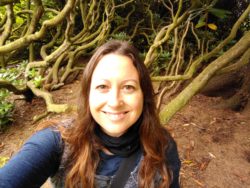
My project explores how climate change activists navigate experiences of eco-anxiety and environmental grief, whether they differ when occurring within faith-based climate collectives, and how existing societal systems for grief and loss might interact with these experiences.
Using a broad interdisciplinary approach and bringing in themes of politics, eschatology, reflexivity, intersectionality and psychotherapy, this project is designed to further academic understandings whilst actively contributing to activist and therapeutic knowledge.
Serena Turton-Hughes
Project title: Bryophytes to branches: exploring dark extinctions through the cultural, philosophical and biological significance of tree extinctions and the extinction of their epibionts
Supervisors: George Holmes and Chris Hassall
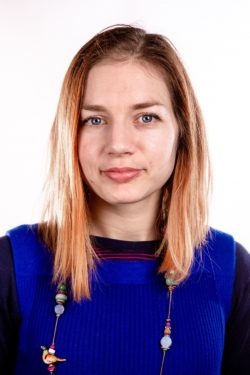 My research explores dark extinctions through the cultural, philosophical and biological significance of tree extinctions and the extinction of their epibionts. I focus on hidden flora, invertebrates and fungi, in tandem with trees as microhabitats, to explore multidisciplinary perceptions of previously unseen species loss. I utilise a fusion of disciplines (conservation biology, environmental humanities, political ecology, environmental psychology, STS) to investigate unrecorded forest biodiversity and the impact learning about this can have. In addition, I draw on my academic background in history, education and philosophy, where I previously specialised in human perceptions of nature.
My research explores dark extinctions through the cultural, philosophical and biological significance of tree extinctions and the extinction of their epibionts. I focus on hidden flora, invertebrates and fungi, in tandem with trees as microhabitats, to explore multidisciplinary perceptions of previously unseen species loss. I utilise a fusion of disciplines (conservation biology, environmental humanities, political ecology, environmental psychology, STS) to investigate unrecorded forest biodiversity and the impact learning about this can have. In addition, I draw on my academic background in history, education and philosophy, where I previously specialised in human perceptions of nature.
Lydia Woods
Project Title: Ecosystem robustness through Earth history
Supervisors: Alex Dunhill, Maria Beger and Chris Hassall
My research project is looking into marine ecosystem structure over the Phanerozoic, from the Cambrian (541 million years ago) to today. Over deep time, marine biodiversity has been subject to major evolutionary events, including major mass extinctions. The effect of these events on the number of global species has been well-documented, however the effects on community-level interactions have been neglected. My project aims to reconstruct ancient food webs from before and after major mass extinctions to pinpoint permanent changes in structure caused by extinction, and to identify the origins of modern marine community structure. Food webs are often used to understand community structure because every species is linked to others through feeding interactions, creating a hierarchical network that can be visualised. As well as this, extinction simulations can test the robustness of a community, i.e. if certain species are artificially removed does a food web then collapse or is it robust enough to survive? Extinction cascade simulations can be used on reconstructed food webs to test if marine communities have been gaining robustness over deep time, and hence explain why there hasn’t been another mass extinction in the last 66 million years.

